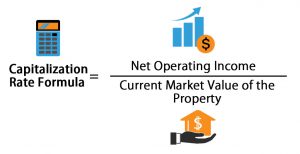What is Capitalization Rate?
Capitalization rate or sometimes called cap rate, is a rate that is found by taking a property’s annual net operating income and dividing it by the property’s current value. So why is capitalization rate so important, and why is it used by almost every real estate investor?

Capitalization rate also called cap rate is used mostly in real estate to predetermine how much money you are expected to make from a property. Which is very important to know if you want to invest in a property. The cap rate can help you determine if it is worth it or not to spend money on a property.
Capitalization rate formula
To find the capitalization rate on a property you want to invest in you can use a formula. The formula consists of two variables. The most recent market value of the property, and the net operating income of that property or called NOI. To find the NOI, you must take the amount of money you will make from the property and then subtract that number by how much it costs for property taxes, maintenance and etc. Let’s imagine that the rent you are paid each year is $100,000 but you have to pay $30,000 for property taxes and maintenance. That means you are left with $70,000. That $70,000 is your NOI. Lastly, you take how much the property was recently sold for and divide it by the NOI and you end up with its capitalization rate. This is the most popular formula but others do exist.
Capitalization rate examples
- If a property sold recently for $500,000 and had an NOI of $50,000, the capitalization rate would be 0.1 or 10%
- If a property recently sold for $1,000,000 and had an NOI of $250,000, the capitalization rate would be 0.25 or 25%
- If a property recently sold for $600,000 and had an NOI of $40,000. the capitalization rate would be 0.06 or 6%
How to use capitalization rate and what to remember
The formula for finding the cap rate should be used when deciding if you should invest money into a property or not. Usually, the higher the percentage your quotient is the better, and the lower your percentage is the riskier it is you might lose your money. In addition, some real estate investors keep a percentage that they won’t go below. For example, an investor might not invest in a property if the cap rate is lower than 10%. Sometimes cap rate is not always the best measure to use. Let’s say a property’s NOI is a bit more complicated and its cash flow varies drastically. An NOI might not be the best option to accurately evaluate the property’s return rate. Instead, you would have to use a discounted cash flow analysis to get a more accurate number. Additionally, when investing in a property there are a few factors you would have to worry about. Some of the factors could be:
- Tenants payment history
- The age of the property
- Condition of the property
Do you use cap rate as one of your metrics when purchasing properties?
#toyoursuccess #mindset #thebestversionofyourself #teamwork #alrencapital

